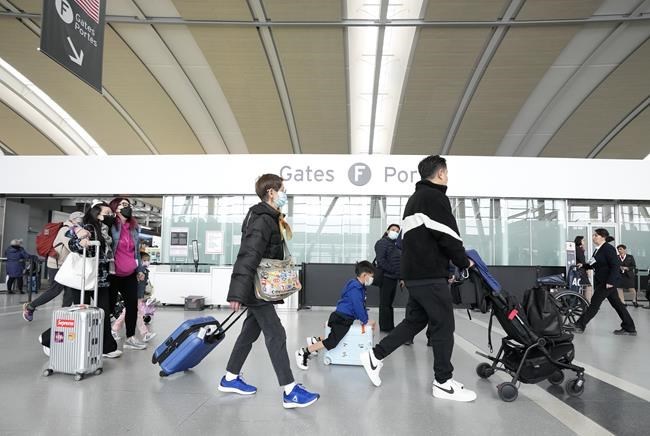MONTREAL — Canada's travel and tourism sector is poised for a big post-pandemic rebound, according to a report from the World Travel and Tourism Council.
The industry is set to contribute $162.6 billion to the Canadian economy in 2023, up 17 per cent from last year, the council said in its latest research. The forecast also comes within sight of the previous peak of $173.9 billion in 2019.
If achieved, the activity would furnish about 90,000 more jobs to reach 1.64 million this year, recovering nearly all the travel and tourism positions scrapped during the COVID-19 pandemic.
Last year, spending from overseas travellers bound for Canada ballooned by 64 per cent to $23 billion, the report said. Council president Julia Simpson said the trend is likely to continue, bringing the expected total this year closer to 2019's $43 billion.
“The sector is a vital driver of economic growth and job creation in Canada, with cities such as Vancouver, Toronto and Montreal remaining must-see global destinations for international visitors," said Simpson, whose organization represents more than 200 companies including airlines, cruise lines and hotels.
Canada's transportation and hospitality businesses were among the most battered by the pandemic, which shut borders and restricted travel and restaurant dining.
The recovery from COVID-19 is far from complete, as inflation and labour shortages gnaw at profit margins and growth.
Bankruptcy filings by restaurants, caterers and other food services have risen by 116 per cent since 2022, according to Restaurants Canada.
"No industry was hit harder by the pandemic than the food service sector, and the industry still has a long road to recovery," the industry group said in a release earlier this month.
Beth Potter, who heads the Tourism Industry Association of Canada, said she expects domestic tourism spending to match pre-pandemic levels this year, but overseas visitors may not reach that peak until 2025. Business-related tourism likely won't fully recover until 2026, she said.
"There's an awful lot of change in the way that we do business — certainly a lot more use of (virtual) technology. But also, when you're booking those big conferences and trade shows, those events are booked multi-years out," Potter said in a phone interview. Business-related tourism event bookings for this year are at 47 per cent of pre-pandemic levels, she said.
The biggest challenge facing tourism operators is labour, with some 300,000 jobs likely to go unfilled this year, Potter said, adding that higher interest rates remain a major thorn as well.
"Most of these businesses took on debt during the pandemic through things like the CEBA loan," Potter said, referring to the federal government's Canada Emergency Business Account for small businesses. The loans of up to $60,000 were interest-free, but will carry a five per cent interest rate starting Jan. 1, 2024.
In 2019, overall tourism spending — on everything from airlines and hotels to bars and festivals — reached about $105 billion, Potter said.
Sparked by pandemic travel restrictions, a growing recognition of the destinations on offer across Canada marks a point of hope for many operators.
“Tourism is important to every community in our country. It’s not something that is only centred around iconic destinations or big cities," Potter said.
The World Travel and Tourism Council predicted the sector will employ 2.1 million people and boost its contribution to gross domestic product to more than $238 billion by 2033, a seven per cent slice of Canada's economy.
The report was conducted in partnership with consulting firm Oxford Economics.
This report by The Canadian Press was first published May 15, 2023.
Christopher Reynolds, The Canadian Press




